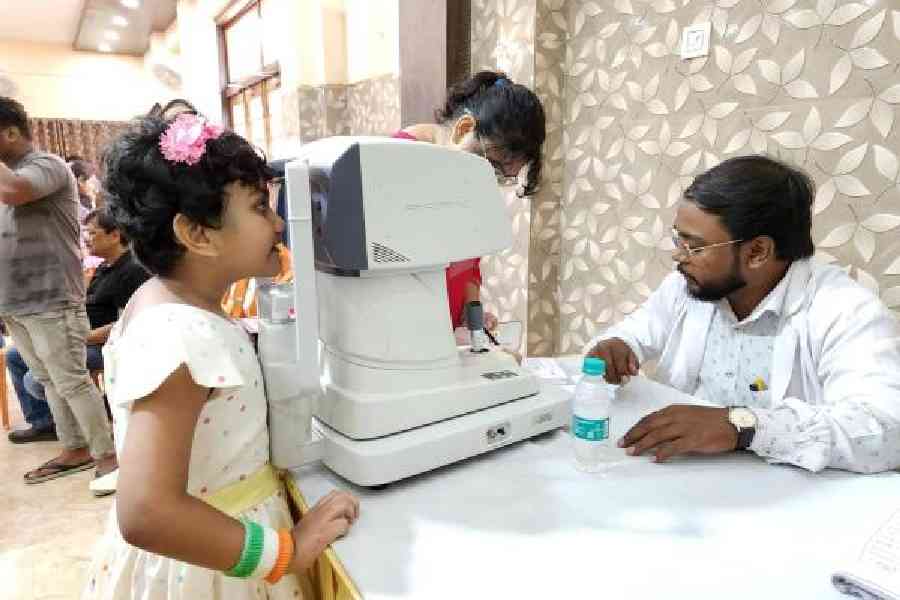There are many who can’t help but stare at a screen for hours as their work is on the computer. But they can try a quick fix to ensure their eyes aren’t harmed by it.
“Remember ‘20-20-20’. Every 20 minutes, look at a point 20 ft away and blink 20 times,” said Debabrata Ghosh, marketing manager of Dr Agarwals Eye Hospital. He was at BC Block community hall for an eye camp and was sharing tips with those who had come for check-ups.
“At times when we’ve been staring at the phone for too long, our vision gets blurry. This happens when the eyes’ natural moisture reduces. At such times, simply blink as it would distribute moisture around the eyes again.”
He also said that watching movies or videos on a TV set was better than on the phone as generally, the wider the screen, the better it is for the eyes. “The glare from screens is also harmful. Those wearing spectacles should opt for glasses that offer blue light protection from screens,” said Ghosh.
Sunglasses are as important to the eyes as sunscreen lotion is for the skin, but beware of cheap ones that are only for show. He also encouraged residents to consume vegetables such as tomato, carrot, cucumber, apple, guava and seasonal fruits that contain the nutrient lutein for eye health. But his most important advice was regular check-ups.
“From the age of three till as long as you live, go for comprehensive eye check-ups twice a year. This includes measurements such as eye pressure, which cannot be assessed when you go to check your power at the neighbourhood spectacle shops. If we wait till a problem arises, it could be too late,” said Ghosh, adding that the procedure takes an hour and at their hospital, opposite SAI complex, costs Rs 500.
Visitors said the tips shared at the camp were new to them. “I do not have any eye problem as such but this morning it was red and slightly painful so I came down to get it checked,” said Paramita Saha, a block resident. “I also learnt today how important it is to get our eyes checked twice a year so I’ll start now.”
There was also a sit-and-draw contest going on, where her daughter took part. There were no winners declared but crayons and certificates were given to all 36 participants.
“Our block has held general health camps before but this was the first time that we held a specialised one for the eyes,” said block secretary Rupak Mitra. “There was a demand for this from residents, who want to get eye check-ups but find it daunting to queue up at hospitals for the same. We were happy to be able to host an event for children too.”
nArt, culture, literature or public taste: which dominates which? When Purbachal-based cultural group Taal Betaal celebrated its 20th anniversary it presented recitation and story telling, but it also turned the spotlight to a thought-provoking panel discussion on the current status of the arts.
Held at Rabindra Okakura Bhavan, the show began with the students’ choral recitation from Antaro mamo bikoshito karo from Gitanjali. In her opening address, founder Ditipriya Sen recalled how the centre was initiated two decades ago with a vision to enrich children with the art and culture of Bengal. The name of the centre was inspired by Sukumar Roy’s poem Abol Tabol.
Veteran elocutionist and chief guest Sumantro Sengupta captivated the audience with his storytelling, drawing from Sukumar Ray’s short story Ashchorjo Kobi and excerpts from Shirshendu Mukhopadhyay’s Ghunpoka. His recitation of Satyendranath Dutta’s Durer Palla, delivered in rhythmic style with voice modulation, received thunderous applause.
The second phase of the show featured a discussion on the topic “Art, culture, literature or public taste: which dominates which?” Speakers included the likes of director, actor, and producer Kaushik Sen and actress Reshmi Sen.
Reshmi noted that as an actress, she strove to deliver her best without compromising standards while successfully inspiring public views. But she lamented that recent trends in casting actors for cinema, serials and OTT platforms based on the number of their Instagram followers vividly illustrated how art and culture were being controlled by public taste.
“But then look at Anusuya Sengupta, who may not fit the typical glamorous mould of contemporary actresses but whose acting prowess in the film The Shameless has fetched her an award at the Cannes Film Festival this year. This shows that art too can transcend public taste,” she noted.
Kaushik Sen focused on the evolution of jatra, referencing his father and mentor Shyamal Sen. He shared an anecdote from the 70s and 80s about jatra’s popularity when a farmer would spend his earnings from selling rice and pulses to buy a ticket for one of his father’s jatras. “But by 1998, when I joined Agragami jatra troupe, Hindi films had begun to influence jatra significantly, indicating that public taste was starting to dominate this traditional art form.”
The event was compered by Kasturi Basu and concluded with a storytelling session by Ditipriya called Hey bandhu biday, accompanied by songs sung by Akash Angana. This item portrayed the agony, loneliness, and deep emotional struggles of Kadambari Debi, wife of Jyotirindranath Tagore.










